人教版高一英语必修一Unit-1单元教案
- 格式:doc
- 大小:106.50 KB
- 文档页数:22
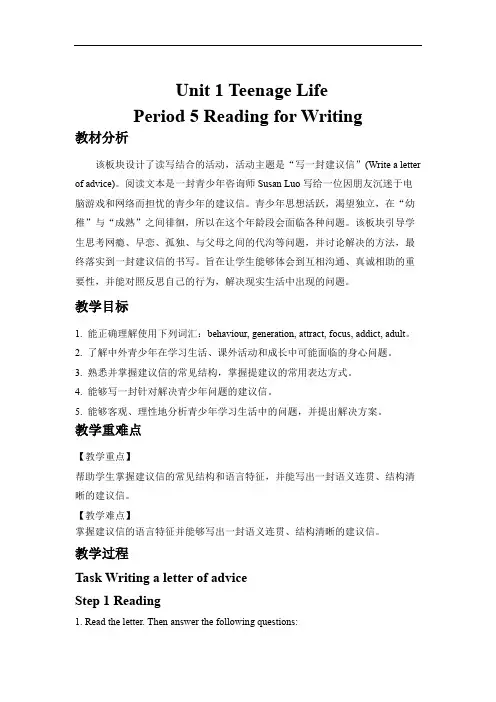
Unit 1 Teenage LifePeriod 5 Reading for Writing教材分析该板块设计了读写结合的活动,活动主题是“写一封建议信”(Write a letter of advice)。
阅读文本是一封青少年咨询师Susan Luo写给一位因朋友沉迷于电脑游戏和网络而担忧的青少年的建议信。
青少年思想活跃,渴望独立,在“幼稚”与“成熟”之间徘徊,所以在这个年龄段会面临各种问题。
该板块引导学生思考网瘾、早恋、孤独、与父母之间的代沟等问题,并讨论解决的方法,最终落实到一封建议信的书写。
旨在让学生能够体会到互相沟通、真诚相助的重要性,并能对照反思自己的行为,解决现实生活中出现的问题。
教学目标1. 能正确理解使用下列词汇:behaviour, generation, attract, focus, addict, adult。
2. 了解中外青少年在学习生活、课外活动和成长中可能面临的身心问题。
3. 熟悉并掌握建议信的常见结构,掌握提建议的常用表达方式。
4. 能够写一封针对解决青少年问题的建议信。
5. 能够客观、理性地分析青少年学习生活中的问题,并提出解决方案。
教学重难点【教学重点】帮助学生掌握建议信的常见结构和语言特征,并能写出一封语义连贯、结构清晰的建议信。
【教学难点】掌握建议信的语言特征并能够写出一封语义连贯、结构清晰的建议信。
教学过程Task Writing a letter of adviceStep 1 Reading1. Read the letter. Then answer the following questions:(1) What is Worried Friend’s problem?(2) What suggestions does Susan Luo give to Worried Friend?(3) Besides suggestions, what else does Susan Luo say in her letter?Step 2 Pre-writing2. Work on Activity 1. Students discuss the last 2 questions in groups.3. Work on Activity 2. Study the organisation and language features. Then summarize the expressions used to make suggestions.设计意图:该环节属于语言输入阶段,活动一关注阅读文本内容,活动二关注文本结构和语言特点。
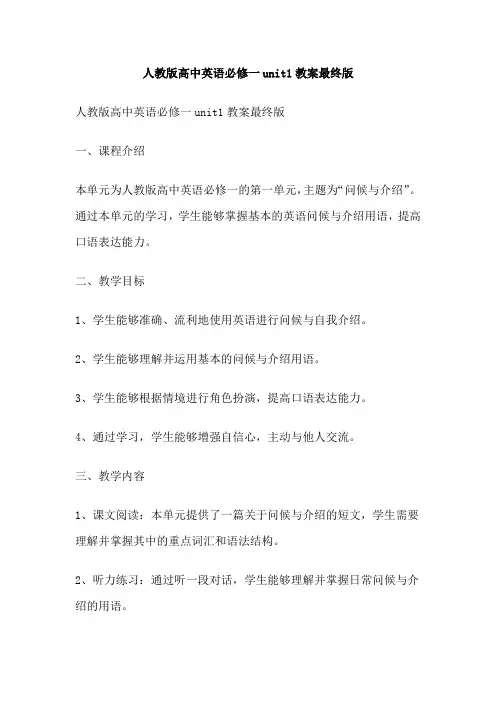
人教版高中英语必修一unit1教案最终版人教版高中英语必修一unit1教案最终版一、课程介绍本单元为人教版高中英语必修一的第一单元,主题为“问候与介绍”。
通过本单元的学习,学生能够掌握基本的英语问候与介绍用语,提高口语表达能力。
二、教学目标1、学生能够准确、流利地使用英语进行问候与自我介绍。
2、学生能够理解并运用基本的问候与介绍用语。
3、学生能够根据情境进行角色扮演,提高口语表达能力。
4、通过学习,学生能够增强自信心,主动与他人交流。
三、教学内容1、课文阅读:本单元提供了一篇关于问候与介绍的短文,学生需要理解并掌握其中的重点词汇和语法结构。
2、听力练习:通过听一段对话,学生能够理解并掌握日常问候与介绍的用语。
3、口语表达:学生需要进行多次口语练习,包括个人介绍、两人对话、小组讨论等,提高口语表达能力。
4、写作训练:学生需要写一篇关于自己或他人的介绍文章,巩固所学知识。
四、教学步骤1、导入新课:通过简单的问候,引导学生进入本单元的主题。
2、讲解新词:学习本单元的新单词,包括生词、词组和习惯用法。
3、课文阅读:阅读本单元提供的短文,并回答相关问题。
4、听力练习:听一段对话,并回答相关问题。
5、口语表达:进行多次口语练习,包括个人介绍、两人对话、小组讨论等。
6、写作训练:写一篇关于自己或他人的介绍文章。
7、复习巩固:回顾本单元所学内容,加深印象。
五、教学评价1、课堂提问:通过提问,检测学生对本单元重点内容的掌握情况。
2、小测验:进行小测验,检测学生对本单元重点词汇、语法和习惯用法的掌握情况。
3、课后作业:布置课后作业,让学生巩固本单元所学内容。
六、教学反思1、成功之处:通过多种教学方法的运用,本节课取得了良好的教学效果,学生积极参与,课堂氛围热烈。
2、不足之处:部分学生的口语表达能力还有待提高,需要加强针对性的训练。
3、改进措施:针对学生的不足,制定个性化的教学方案,加强针对性的训练,提高学生的口语表达能力。
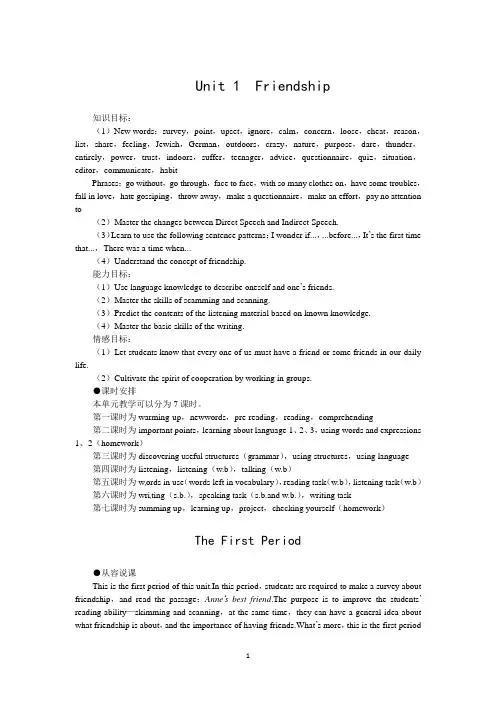
Unit 1 Friendship知识目标:(1)New words:survey,point,upset,ignore,calm,concern,loose,cheat,reason,list,share,feeling,Jewish,German,outdoors,crazy,nature,purpose,dare,thunder,entirely,power,trust,indoors,suffer,teenager,advice,questionnaire,quiz,situation,editor,communicate,habitPhrases:go without,go through,face to face,with so many clothes on,have some troubles,fall in love,hate gossiping,throw away,make a questionnaire,make an effort,pay no attention to(2)Master the changes between Direct Speech and Indirect Speech.(3)Learn to use the following sentence patterns:I wonder if...,...before...,It’s the first time that...,There was a time when...(4)Understand the concept of friendship.能力目标:(1)Use language knowledge to describe oneself and one’s friends.(2)Master the skills of scamming and scanning.(3)Predict the contents of the listening material based on known knowledge.(4)Master the basic skills of the writing.情感目标:(1)Let students know that every one of us must have a friend or some friends in our daily life.(2)Cultivate the spirit of cooperation by working in groups.●课时安排本单元教学可以分为7课时。
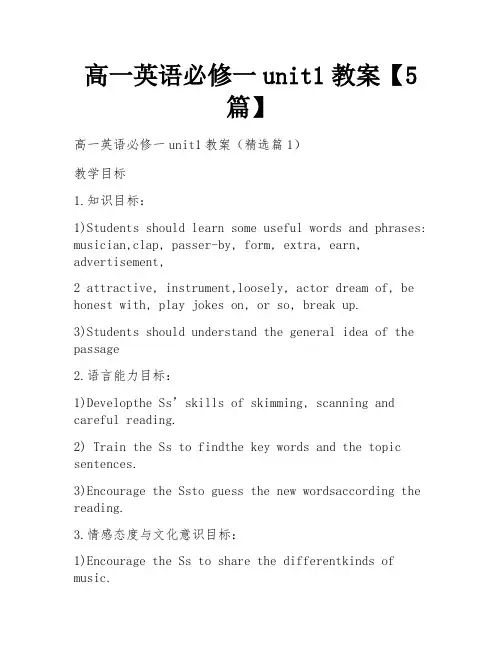
高一英语必修一unit1教案【5篇】高一英语必修一unit1教案(精选篇1)教学目标1.知识目标:1)Students should learn some useful words and phrases: musician,clap, passer-by, form, extra, earn, advertisement,2 attractive, instrument,loosely, actor dream of, be honest with, play jokes on, or so, break up.3)Students should understand the general idea of the passage2.语言能力目标:1)Developthe Ss’skills of skimming, scanning and careful reading.2) Train the Ss to findthe key words and the topic sentences.3)Encourage the Ssto guess the new wordsaccording the reading.3.情感态度与文化意识目标:1)Encourage the Ss to share the differentkinds of music.2)Improve the cooperation and share among the students.教学重难点1、教学重点:a.To understudend the passage better b.To find the main idea of eachparagraph2、教学难点:a.Master the reading ability b.Develop the skills ofreading教学过程教学设计本节课共45分钟,具体教学步骤如下:Step I Leading-in播放一段小视频,内容为歌曲 If you arehappy的英文版本,通过介绍演唱乐队twins引出本单元话题。
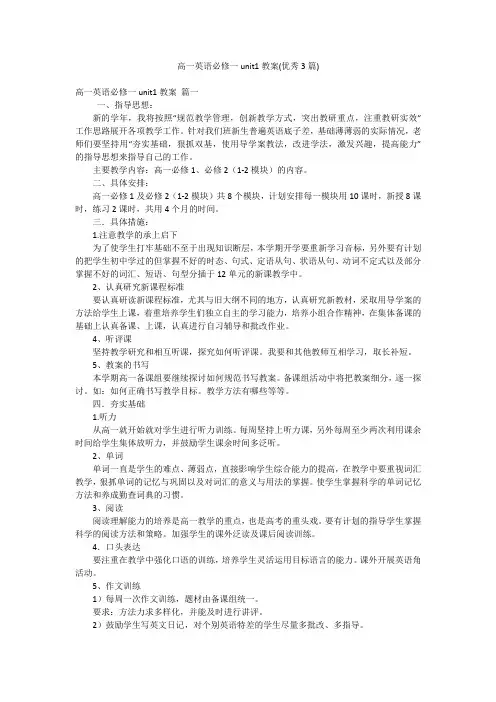
高一英语必修一unit1教案(优秀3篇)高一英语必修一unit1教案篇一一、指导思想:新的学年,我将按照“规范教学管理,创新教学方式,突出教研重点,注重教研实效”工作思路展开各项教学工作。
针对我们班新生普遍英语底子差,基础薄薄弱的实际情况,老师们要坚持用“夯实基础,狠抓双基,使用导学案教法,改进学法,激发兴趣,提高能力”的指导思想来指导自己的工作。
主要教学内容:高一必修1、必修2(1-2模块)的内容。
二、具体安排:高一必修1及必修2(1-2模块)共8个模块,计划安排每一模块用10课时,新授8课时,练习2课时,共用4个月的时间。
三.具体措施:1.注意教学的承上启下为了使学生打牢基础不至于出现知识断层,本学期开学要重新学习音标,另外要有计划的把学生初中学过的但掌握不好的时态、句式、定语从句、状语从句、动词不定式以及部分掌握不好的词汇、短语、句型分插于12单元的新课教学中。
2、认真研究新课程标准要认真研读新课程标准,尤其与旧大纲不同的地方,认真研究新教材,采取用导学案的方法给学生上课,着重培养学生们独立自主的学习能力,培养小组合作精神,在集体备课的基础上认真备课、上课,认真进行自习辅导和批改作业。
4、听评课坚持教学研究和相互听课,探究如何听评课。
我要和其他教师互相学习,取长补短。
5、教案的书写本学期高一备课组要继续探讨如何规范书写教案。
备课组活动中将把教案细分,逐一探讨。
如:如何正确书写教学目标。
教学方法有哪些等等。
四.夯实基础1.听力从高一就开始就对学生进行听力训练。
每周坚持上听力课,另外每周至少两次利用课余时间给学生集体放听力,并鼓励学生课余时间多泛听。
2、单词单词一直是学生的难点、薄弱点,直接影响学生综合能力的提高,在教学中要重视词汇教学,狠抓单词的记忆与巩固以及对词汇的意义与用法的掌握。
使学生掌握科学的单词记忆方法和养成勤查词典的习惯。
3、阅读阅读理解能力的培养是高一教学的重点,也是高考的重头戏。
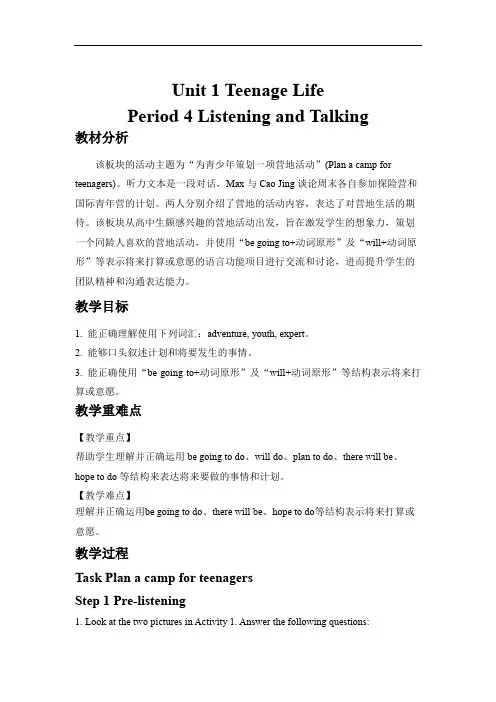
Unit 1 Teenage LifePeriod 4 Listening and Talking教材分析该板块的活动主题为“为青少年策划一项营地活动”(Plan a camp for teenagers)。
听力文本是一段对话,Max与Cao Jing谈论周末各自参加探险营和国际青年营的计划。
两人分别介绍了营地的活动内容,表达了对营地生活的期待。
该板块从高中生颇感兴趣的营地活动出发,旨在激发学生的想象力,策划一个同龄人喜欢的营地活动,并使用“be going to+动词原形”及“will+动词原形”等表示将来打算或意愿的语言功能项目进行交流和讨论,进而提升学生的团队精神和沟通表达能力。
教学目标1. 能正确理解使用下列词汇:adventure, youth, expert。
2. 能够口头叙述计划和将要发生的事情。
3. 能正确使用“be going to+动词原形”及“will+动词原形”等结构表示将来打算或意愿。
教学重难点【教学重点】帮助学生理解并正确运用be going to do、will do、plan to do、there will be、hope to do等结构来表达将来要做的事情和计划。
【教学难点】理解并正确运用be going to do、there will be、hope to do等结构表示将来打算或意愿。
教学过程Task Plan a camp for teenagersStep 1 Pre-listening1.Look at the two pictures in Activity 1. Answer the following questions:(1)What kind of camp is Adventure Camp/International Youth Camp?(2)What activities will it include?(3)What can students learn in these activities?2.Read the sentences in Activity 1. Then predict the main idea of the conversation. Step 2 While-listening1. Work on Activity 1. Listen to the conversation and tick what are heard about the camps.2.Work on Activity 2. Underline the expressions in the sentences above that Cao Jing and Max use to talk about the future.设计意图:该环节让学生通过勾画听力文本中的目标结构,关注对话中如何表达将来要做的事情和计划。
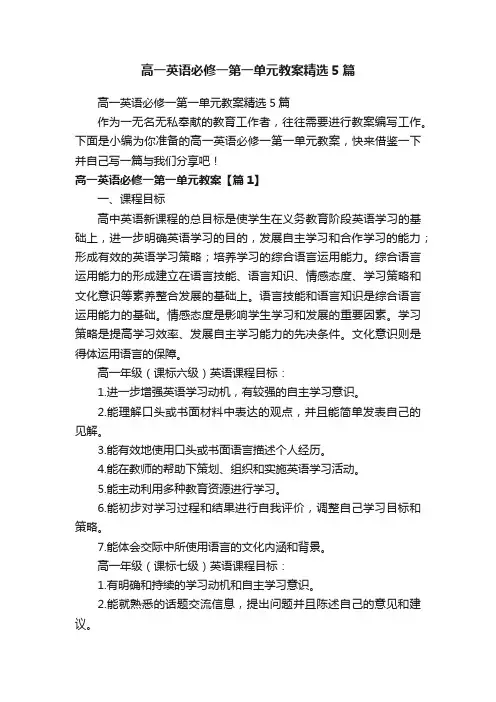
高一英语必修一第一单元教案精选5篇高一英语必修一第一单元教案精选5篇作为一无名无私奉献的教育工作者,往往需要进行教案编写工作。
下面是小编为你准备的高一英语必修一第一单元教案,快来借鉴一下并自己写一篇与我们分享吧!高一英语必修一第一单元教案【篇1】一、课程目标高中英语新课程的总目标是使学生在义务教育阶段英语学习的基础上,进一步明确英语学习的目的,发展自主学习和合作学习的能力;形成有效的英语学习策略;培养学习的综合语言运用能力。
综合语言运用能力的形成建立在语言技能、语言知识、情感态度、学习策略和文化意识等素养整合发展的基础上。
语言技能和语言知识是综合语言运用能力的基础。
情感态度是影响学生学习和发展的重要因素。
学习策略是提高学习效率、发展自主学习能力的先决条件。
文化意识则是得体运用语言的保障。
高一年级(课标六级)英语课程目标:1.进一步增强英语学习动机,有较强的自主学习意识。
2.能理解口头或书面材料中表达的观点,并且能简单发表自己的见解。
3.能有效地使用口头或书面语言描述个人经历。
4.能在教师的帮助下策划、组织和实施英语学习活动。
5.能主动利用多种教育资源进行学习。
6.能初步对学习过程和结果进行自我评价,调整自己学习目标和策略。
7.能体会交际中所使用语言的文化内涵和背景。
高一年级(课标七级)英语课程目标:1.有明确和持续的学习动机和自主学习意识。
2.能就熟悉的话题交流信息,提出问题并且陈述自己的意见和建议。
3.能读懂供高中学生阅读的英文原著简写本及英语报刊。
4.具有初步的实用写作能力,例如:事务通知和邀请信等。
5.能在教师的指导下,主动参与计划、组织和实施语言实践活动。
6.能主动扩展和利用学习资源,从多渠道获取信息,并能利用所获得的信息进行清楚和有条理的表达。
7.具有较强的自我评价和自我调控能力,基本形成适合自己的学习策略。
8.理解交际中的文化差异,初步形成跨文化交际意识。
二、课程内容完成牛津英语第三第四模块的全部内容。
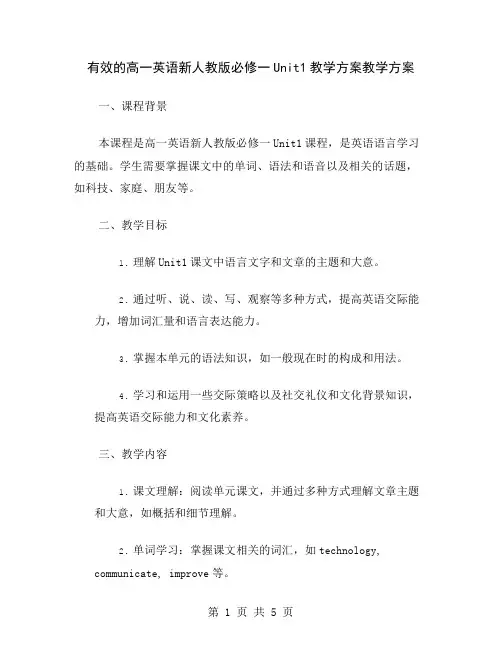
有效的高一英语新人教版必修一Unit1教学方案教学方案一、课程背景本课程是高一英语新人教版必修一Unit1课程,是英语语言学习的基础。
学生需要掌握课文中的单词、语法和语音以及相关的话题,如科技、家庭、朋友等。
二、教学目标1.理解Unit1课文中语言文字和文章的主题和大意。
2.通过听、说、读、写、观察等多种方式,提高英语交际能力,增加词汇量和语言表达能力。
3.掌握本单元的语法知识,如一般现在时的构成和用法。
4.学习和运用一些交际策略以及社交礼仪和文化背景知识,提高英语交际能力和文化素养。
三、教学内容1.课文理解:阅读单元课文,并通过多种方式理解文章主题和大意,如概括和细节理解。
2.单词学习:掌握课文相关的词汇,如technology,communicate, improve等。
3.语法知识:学习一般现在时的用法、构成和否定、疑问句的构成等。
4.口语练习:通过合作交流、角色扮演、小组讨论等方式,模拟现实生活中的交流情景,提高英语口语表达能力。
5.书写练习:在课堂上进行手写和键盘书写练习,提高英语书写水平和规范性。
四、教学方法1.任务型教学:通过任务型教学法,让学生参与课堂活动和实践,积极探究学习内容和语言形式,提高学习效果。
2.全英语教学:课堂教学语言使用英语,在潜移默化中加强学习者英语交际能力。
3.多媒体教学:利用多媒体教学手段,如影片、图片和音频等资源,激发学生学习兴趣,增加视听刺激。
4.语言实践教学:课堂教学注重实践、应用和交流,通过小组讨论、角色扮演等活动,提高学生英语语言的实际运用能力。
五、教学流程1.课前预习:师生提前预习本课内容,准备好相关教学材料。
2.课堂引导:教师对学生开展自我介绍,认识彼此,激发学生学习兴趣。
3.课文理解:利用多媒体和小组讨论等方式,让学生深入理解课文大意和相关语言形式。
4.单词学习:采用游戏、竞赛等方式,让学生更好地掌握课文中包含的单词。
5.语法知识:通过例子和练习,让学生掌握一般现在时的构成、用法和否定、疑问句的构成等语法知识。
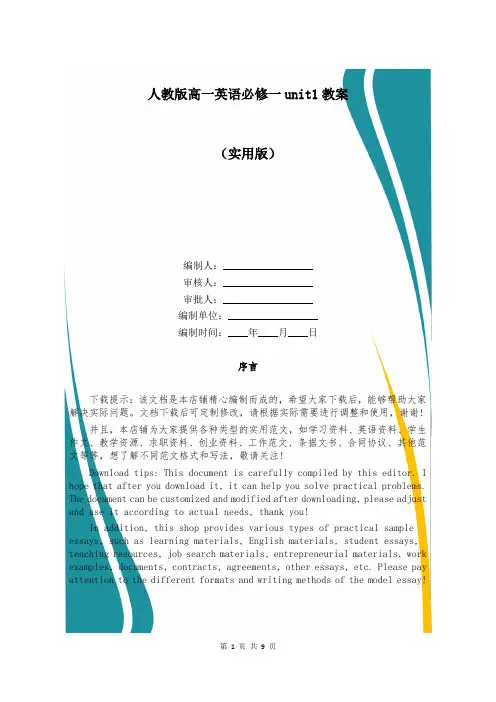
人教版高一英语必修一unit1教案(实用版)编制人:__________________审核人:__________________审批人:__________________编制单位:__________________编制时间:____年____月____日序言下载提示:该文档是本店铺精心编制而成的,希望大家下载后,能够帮助大家解决实际问题。
文档下载后可定制修改,请根据实际需要进行调整和使用,谢谢!并且,本店铺为大家提供各种类型的实用范文,如学习资料、英语资料、学生作文、教学资源、求职资料、创业资料、工作范文、条据文书、合同协议、其他范文等等,想了解不同范文格式和写法,敬请关注!Download tips: This document is carefully compiled by this editor. I hope that after you download it, it can help you solve practical problems. The document can be customized and modified after downloading, please adjust and use it according to actual needs, thank you!In addition, this shop provides various types of practical sample essays, such as learning materials, English materials, student essays, teaching resources, job search materials, entrepreneurial materials, work examples, documents, contracts, agreements, other essays, etc. Please pay attention to the different formats and writing methods of the model essay!人教版高一英语必修一unit1教案This is the first period of this unit.In this period,students are expected to discuss what kind of person they are.The purpose is to give students chance to practice their oral English,at the same time.一起看看人教版高一英语必修一unit1教案!欢迎查阅!高一英语必修一unit1教案1This is the first period of this unit.In this period,students are expected to discuss what kind of person they are.The purpose is to give students chance to practice their oral English,at the same time,they can have a general idea about what are the qualities they should find in a great person.In this period,there is a part designed to practice speaking and reading.In order to make students have a thorough idea of qualities great people have in common,and predict the contents of reading,it is important to make good use of the six pictures,especially Nelson Mandela.What’s more,this is the first period of this unit,so it is necessary to deal with the new words and expressions of this part,so as to make it easy for students to begin and make them less anxious in study.●三维目标 1.Knowledge:Learn and master the new words and expressions in thisperiod. Words:hero,quality,willing,active,republic,principle,nationalism,livelihood,fight,peaceful,prison,prisoner,law,advise,continue,fee,gold,passbook,ANC,youth,league,stage,vote,position,accept,violence,equal Phrases:lose heart,in trouble,worry about,out of work,Youth League,as a matter of fact,blow up,put...in prison2.Ability:(1)Talk about the fine quality of great people to improve the students’ speaking ability. (2)Do reading practice to improve the students’ reading abilities. 3.Emotion:(1)Learn about some great people and qualities they have in common. (2)Develop the students’ moral quality. ●教学重点(1)Talk about the fine quality of great people to improve the students’ speaking ability. (2)Enable the students to grasp the main idea of the passage. (3)Improve the students’reading ability. ●教学难点(1)How to express their own opinions and ideas. (2)How to grasp the main idea of a text or a passage. ●教具准备The multimedia and the blackboard. ●教学过程 Step 1 GreetingsGreet the whole class as usual. Step 2 Lead-in T: (Walkto one boy) Wang Bin,what do you usually do on weekends? S1:I sometimes play basketball with friends.I like basketball very much.T:Do you know who he is?S1:Of course I do.He is Jordan,my idol.He is the best basketball player in the world.I have many pictures of him.T:Yes,you’re quite right.He is very famous and many people all over the world worship him.But do you know that it was not until about fifty years ago that the blacks got their freedom and were treated as equal citizens?S2:Yes,we learnt about this in our history classes.The blacks were first brought to America as slaves.They were treated badly and they had no rights.T:That’s right.But we all know that things are different now.Do you know how they could have the same rights as the whites?S3:We don’t know much about this.Please tell us more.T:OK.Many people devoted themselves to this.Some were put into prison and some even lost their lives.Look at the two pictures and read the notes about them.Then have a discussion in groups of four.Try to explain why they are great men.(Show the following pictures and their information on the screen高一英语必修一unit1教案2(1) 课题:Earthquakes (2) 教材分析与学生分析:本单元的主题是“地震”。
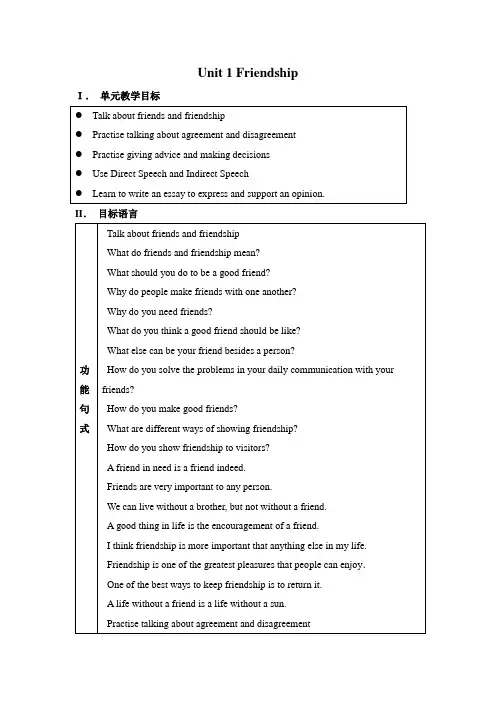
Unit 1 Friendship I.单元教学目标II.目标语言III. 教材分析和教材重组1. 教材分析本单元以Friend和Friendship为话题,旨在通过单元教学使学生通过讨论什么是好朋友,什么是真正的友谊,如何交友和保持友谊等问题,使学生树立正确的交友观。
并针对日常交友过程中经常遇到的实际问题,指导学生发表自己的见解和看法,通过进一步讨论提供有效的解决方案。
并能就此以编辑的身份写出指导信,对相关谚语写出观点明确、论证有力的短文。
1.1 Warming Up以调查问卷的形式,通过对学生在日常交友过程中所遇到的五个问题,展开调查,使学生对是否擅长交友做出评价,激发学生对本单元的中心话题产生兴趣;同时也使教师本单元的授课更具有针对性,从而有效地帮助学生树立正确的交友观。
1.2 Pre-Reading通过四个问题引导学生讨论交友的重要性以及自己心目中好朋友的概念和标准,并使学生认识到不仅人与人,人与物(如日记)也可以成为好朋友。
继续探究并树立正确交友观,并为阅读作好了准备。
1.3 Reading讲述第二次世界大战的纳粹统治时期,犹太人Anne一家过着滇沛流漓,与世隔绝的生活。
Anne在孤独中只能以日记Kitty 为友,倾诉衷肠,伴其渡过两年的逃亡生涯。
控诉了纳粹党的残暴统治给犹太人民带来了深重的灾难,并以日记的形式表达了以主人公Anne为代表的全世界人民憎恨战争渴望和平的共同心愿。
学生学习了新的词汇、句型,提高了阅读水平。
文中选用了主人公的一篇日记,使学生进一步感受到了挚友的可贵,对主人公内心世界的描写有了更深刻的理解。
1.4 Comprehension 设计了三种题型。
其中前两个是考查学生对READING文章细节内容的理解,最后一题是开放性问题,学生可以在更深入理解主人公内心世界的基础上各抒己见,使学生养成勤于思考勇于探究的良好的学习习惯,现时也培养了学生的想象力,进一步提高了阅读水平。
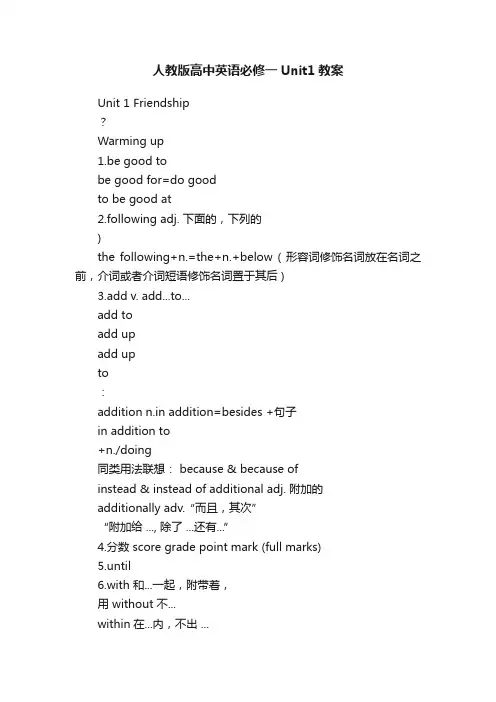
人教版高中英语必修一Unit1教案Unit 1 FriendshipWarming up1.be good tobe good for=do goodto be good at2.following adj. 下面的,下列的)the following+n.=the+n.+below ( 形容词修饰名词放在名词之前,介词或者介词短语修饰名词置于其后 )3.add v. add...to...add toadd upadd upto:addition n.in addition=besides +句子in addition to+n./doing同类用法联想: because & because ofinstead & instead of additional adj. 附加的additionally adv.“而且,其次”“附加给 ..., 除了 ...还有...”4.分数 score grade point mark (full marks)5.until6.with 和...一起,附带着,用 without 不...within在...内,不出 .... write with a peneat with hands/ spoon/chopsticks/knife and fork He left without saying goodbye.He left with the water running.分析:saying 前无名词,则是主语发出saying 的动作;running 前有 water,因此是 water 发出 running 的动作,而不是句子的主语 he。
翻译练习:(1)他今天去上班没带领带。
Today, he went to work without (wearing) his tie.(2)他在没有其他人帮助的情况下自己完成了作业。
7.pay forpay to dosth8. get sb to do sth(make/have/let sb do sth)get sb/sth doneget done get lost/prepared/dressed/involved9.形容词做状语,表示句子主语的特征、属性和状态副词做状语,表示谓语动词的完成方式. He returned home last night, sad and disappointed.He left hurriedly.10. concern n. 担心,忧虑concern about/for/over.... She hasn’tbeen seen for four days and there is concern for her safety.That is a big concern.v. 涉及,与 ...有关be concerned withconcerning . He asked several questions concerning the future of thecompany. 翻译练习:不要问女人们涉及她们年龄的问题。
人教版高一英语必修1 Unit1 Friendship教学设计完美版一、教学目标1. 学生能够掌握本单元的重点词汇和短语,如add up、upset、ignore 等,并能在实际情境中正确运用。
2. 学生通过阅读文本,理解友谊的重要性,提高阅读理解能力。
3. 学生能够运用所学语言知识,描述自己的朋友和友谊,提升写作和口语表达能力。
4. 培养学生的合作学习能力和团队意识,通过小组讨论等活动,增强学生之间的友谊。
二、教学重点与难点教学重点:掌握重点词汇和短语,理解文本内容,提高阅读和写作能力。
教学难点:学生对友谊主题的深入理解和感悟,以及在写作和口语表达中准确运用所学知识。
三、教学方法1. 情景教学法:通过创设与友谊相关的情景,如朋友之间的对话、友谊故事等,让学生在真实的情境中学习英语。
2. 小组讨论法:组织学生进行小组讨论,分享自己的友谊故事和对友谊的理解,激发学生的学习兴趣和参与度。
3. 多媒体教学法:运用图片、视频等多媒体资源,帮助学生更好地理解友谊主题和文本内容。
四、教学过程(一)导入师:“同学们,咱们先来一起看一段超有意思的英文短视频。
这个视频讲的可都是关于友谊的故事哦。
”(播放一段关于友谊的英文短视频,视频中可以有好朋友一起玩耍、互相帮助、共同度过困难等场景)师:“怎么样,同学们,这个视频好看不?”生:“好看!”师:“那大家从这个视频里看到了什么呀?”生:“看到了好朋友一起玩。
”“看到他们互相帮助。
”……师:“对呀,这就是友谊。
今天呢,咱们就一起来学习人教版高一英语必修 1 Unit1 Friendship,好好探讨一下友谊这个话题。
”(二)文本讲解师:“现在呢,咱们打开课本,一起来看看这篇课文里是怎么描述友谊的。
”(展示课本原文内容)“Anne’s Best FriendDo you want a friend whom you could tell everything to, like your deepest feelings and thoughts? Or are you afraid that your friend would laugh at you, or would not understand what you are going through? Anne Frank wanted the first kind, so she made her diary her best friend.Anne lived in Amsterdam in the Netherlands during World War II. Her family was Jewish so they had to hide or they would be caught by the German Nazis. She and her family hid away for nearly twenty-five months before they were discovered. During that time the only true friend was her diary. She said, ‘I don’t want to set down a series of facts in a diary as most people do, but I want this diary itself to be my friend, and I shall call my friend Kitty.’Now read how she felt after being in the hiding place since July 1942.”师:“同学们,咱们先来看看第一段哈。
【2019统编版】人教版高中英语必修第一册Unit 1全单元备课教案教学设计1.1 Period 1 Listening and Speaking教学目标与核心素养:1. Let students master the useful words and expressions about school clubs and ways to express their hobbies or interests2. Let students briefly understand functions of different clubs and be aware of the ways of choose a suitable club.3. Get students to practice grasping topics and details while listening a dialogue.4. Get students to talk about topics relating to campus clubs.教学重难点:Importance:1. Get students to practice grasping topics and details while listening a dialogue.2. Get students to talk about topics relating to campus clubs.Difficulty:Guide the students to combine the topic with useful expressions about interests and preferences, and express themselves freely .课前准备:1.Ask the students to make preparations in vocabulary and phrases related to the theme of the period.2.Help the students to finish the Guided Learning Plan教学过程:Step 1Warming upActivity 1Ask Ss to match the photos with the names of the clubs. And hold a brief discussion about what the students are doing in the clubs.Step 2 Listening (1)Activity 2Guide the students to listen to the first two conversations and choose the correct answers.Remind the students to pay attention to the Predict Content:“Before you listen, you can read the questions and choices. It will help you topredict what you will hear.”1.What are they learning about in Conversation 1 ?(A)A. HearingB. SoundsC. Dogs.2.The students are discussing_____ in Conversation 2.(C)A. school workB. relationshipsC. dating.3.Circle the two clubs where these two conversations happened. (A)(D)A. Science ClubB. Ballet ClubC. Nature ClubD. Debate ClubActivity 3Guide the students to listen to conversation3. Then finish the following exercise.1. Tick the activities that happen in each club.Ballet Club Nature Club Cartoon Club Volunteer Clublearn new movements listen to lectures watch cartoons help old peoplewatch dance programs grow plants writes stories clean up parksmake Ballet clothes work in a greenhouse draw cartoons give directions.2. Adams says that he likes ___________but is not so interested in _________ .(B)A. stories, cartoonsB. animals, plantsC. making friends, cleaning up.3. Which club do you think is suitable for Adam? Why?I think Adam should join the Volunteer Club because he likes to do something outdoors.Step 3 SpeakingActivity 4Organize the students to working pairs and help each other choose a school club.Make some preparations before pair work.Brainstorm USEFUL WORDS and EXPRESSIONS FOR THE PAIR WOWRK. Are you going to join …?. I’d like to…, but I am not sure….. Which club do you like to join?. Have you decided which club to join?. My dream is to be……. …is not for me.. I like …,but I am not so interested in….…Provide an example for the students to modify.EXAMPLEA: Hi, Sam! I've decided to join the Music Club.B: Good decision!A: How about you? Are you going to join a club?B: Yes I'm wondering which one I should choose:the Act Club or the Ballet Club?A: I guess the question is… Do you like dancing better than acting?B: Actually, I like acting better, but my friends go to the Ballet Club and I want to be with them.A: Hmm…If you ask me,I think you should choose what you like.Step 5 PronunciationActivity 5Listen and repeat.Guide the students to listen and pay attention to the combinations of lettersEncourage the students to add more words to each groupProvide help whenever necessary.al talk, wall, ball,fall,call, all…ay pay, stay, delay, day, may, play, display, away…ai paint, daily, gain, pain, hailstone, wait…are care, declare, dare, prepare, spare, scare…ar bar, hard, car, star, large, enlarge…er her, prefer, teacher, farmer, paper …ir bird, circus, circle, ,third, thirsty, fir, birthday, shirt, dirty……or horse, absorb, bore, door, story…or word, work…ur burn, hurt, fur, turn, nurse, turtle, purple…ee keen, tree, fee, seem, feet, teeth…ea clean, eager, teach, leave, speak…ea head, ready, bread, weather, sweater, heavy…ear clear, appear, fear, hear, dear, near, ear, …ear earn, heard, search, learn, earn, earth…oa boat, coach, coat, goat, load, …ow show, grow, low, blow, slow, follow, eyebrow……ow now, shower, town, down, how, tower…ou out, loud, about, loud, doubt, mouth, house, mouse…ore more, bored, forecast, forehead, core…2. Guide the students to listen to the proverbs and repeat. Notice the pronunciation of the letters in bold.1. The early bird catches the worm.2. Always prepare for a rainy day.3. Actions speak louder than words.4. All work and no play makes Jack a dull boy.5. Distance tests a horse’s strength. Time reveals a person's character.Period 2 Reading and Thinking教学目标与核心素养:1. Let students master useful words and phrases related to the text;2. Let students understand the challenges Adam meets in his new schooland compare the similarities and differences of their school and Adam’s;3. Help the students finish vocabulary exercises in the text book.4. Get students to understand they should learn to face difficultiesand challenges in senior high school for their own future.教学重难点:Importance:Help the students to master key words and phrases in the text.Guide students to compare school life in different places.3. Guide the students to learn about Adam’s school life and understand that everyone should overcome difficulties in a new situation.Difficulty:Guide the students compare their school life and Adam’s, and discussways to deal with challenges.课前准备:1.Ask the students to prepare new words and phrases related to the contents of the text.2.Mark the new words in the textbook, understand the meaning in context, or consult the dictionary to understand the meaning.教学过程:Step 1 Preparationfreshman ___________ junior high school ___________ Senior high school___________confusing ___________ choose courses___________ signup___________extra-curricular activities___________ hand out ___________ homeless people___________in the community ___________ get used to doing___________ keep upwith ___________challenge _________ topic________ fluent _________ graduate ________recommend ___________ literature_________ obviously_________quit_________be responsible for _________ schedule_________ editor_________Step 2 Warming upCompare school life in different placesActivity 1Guide the students to take part in the group work and discuss schoollife in and out of China.Ask Ss to work in groups and discuss the questions.What do you want to know about the school life in other countries?Possible answers:I want to know whether they take extra courses during summer or winter vocations.I wonder if they have enough free time to develop their own interests.I am interested in what subjects they study at school.…What would you tell a teenager from another country about school lifein China?I am happy to come to my new school and know a lot of new friends.Our teachers are patient and helpful.I feel a little worried about my study because I have more subjectsto learn.…Activity 2Read the text quickly to find the main idea of each paragraph.Guide the students to read the text quickly and fill in the blanks in this part.Possible answers:Paragraph1:Senior high school is a Challenge.Paragraph2:It is important to choose courses.Paragraph3:Extra-curricular activities are also important.Paragraph4:A senior high student must work harder and be more responsible.Step3 Intensive readingActivity 3Read the text again and answer the questions.Guide the students to read the text carefully and find the answers to the following questions.What causes did Adams choose? Which one do you think would be his favorite? Why?What does “make the team” in paragraph mean?What is Adam worried about?Is Adam confident that he will get used to senior school life? How do you know?Possible answers:Adam chooses Math, English chemistry, world history and Chinese. I think. English advanced literature is his favorite because he likes English, and he is good at it.It means joining the football team.He is worried that he can’t keep up with other students in his advanced course and get used to all the homework.Yes, he is. On the one hand, Adam knows that he has to study harderas a senior school student to be well prepared for his future. On the other hand, Adam knows that school advisers and teacher can give him help when he is faced with problems.Activity 4Complete the outline. Then discuss the questions below with a partner.Get the students to work in pairs and fill in the blanks after discussing the questions carefully. Encourage the students to find clues from the text.Guide the students to discuss the following questions and encourage them to answer the questions according to Adam’s story and their own situation.What kind of person do you think Adam is? Why?Do you face the same challenges as Adams? What other challenges areyou facing?What are some differences between Adam’s school and your school life?Possible answers:Adam is clear-minded and responsible for himself. When he chooses courses, he knows his advantages。
Unit 1 Teenage Life-Reading for Writing【教材分析】This teaching period mainly deals with reading for writing a letter of advice. Students are expected to learn the knowledge about how to write a suggestion letter. The teacher is expected to enable students to master some writing skills concerning suggestion letters and learn to write one.【教学目标与核心素养】1. Get students to have a good understanding of how to write a suggestion letter properly.2. Enable students to use some writing skills flexibly.3. Develop students’ writing and cooperating abilities.4. Strengthen students’ great interest in writing discourses.【教学重难点】1. How to enable students to have a good understanding of the skills of writing a suggestion letter2.How to enable students to write a good recommendation letter using some writing skills properly.【教学过程】Step 1: Lead inBegin the class with the lead-in questions: how to write a letter for advice? What kinds of aspects should be included? It is strongly recommended that the teacher should ask students to discuss the topic freely with their partners and brainstorm some ideas concerning the topic. In this way, students can come up withmore ideas and avoid being nervous at the beginning of the class.Step 2: Read to discover details concerning advice letters’ writing style.The teacher is expected to ask students to read a letter offering some advice on page 18 silently and then request students to discuss the questions below.In this step, what should be highlighted is that the teacher ought to give students enough time to read individually and think independently. There is no need for themto discuss the detailed questions. In this way, students can develop their individual logical thinking ability and promote their skills of finding details.1. What is Worried Friend’s problem?2. Do you think Ms Luo’s advice is useful? Why or why not?3. What other kinds of advice would you give?Step 3: Read to sum upAfter learning the passage on Page 18, the teacher leads students to figure out the organization of the letter and appreciate its language features.1.Find and mark the parts of the letter that match the following points.A.I know what the problem is. B I understand how you feel.C.This is my advice and reasons D I think my advice will help.2.What expressions does Ms Luo use to make suggestions? Circle them in the letter.Step 4: Use what you have learnt to write a letter of advice to one of the teenager below.In this step, the teacher asks students to sum up some ideas regarding the following topic:Eric 15, ChicagoXu Ting 14 HangzhouMin Ho, 15, SeoulStep 5: Use what you have learnt to draft a letter offering advice to any of those students above.2. Exchange draftsAfter each student finishes their own writing, ask them to exchange the drafts with their desk mates and evaluate the drafts with the following criteria.Use the checklist to give feedback on your partner’s draft.√Are all the parts of a letter included and organized in a good order?√Does the writer give reasons for the advice?√Does the writer use proper expressions to give suggestions?√Does the writer use commas and stops correctly?√Is the handwriting easy to read?3.Write down some writing expressions and models concerning advice letters. 活动目的:教育学生懂得“水”这一宝贵资源对于我们来说是极为珍贵的,每个人都要保护它,做到节约每一滴水,造福子孙万代。
Unit 1 Teenage Life-Reading and Thinking【教材分析】The topic of this unit is about teenage life, which belongs to the theme context of “humans and oneself”.As teenagers who shoulder the responsibility of “Chinese great dream”, they must fully know themselves, including their strengths, weaknesses and challenges etc. They are supposed to improve themselves continuously and readily study their subjects, and thus foster their strategies and confidence in lifelong studies.This period is entitled the freshmen challenges, which mainly concerns some big challenges for new students in Senior high school. In this period, a teacher should lead students to find out what their challenges are and guide them to figure out how to crack the challenges and better themselves. More importantly, a teacher should instruct students to absorb new language points and appreciate the language. Besides, a teacher must instruct students to acquire some skills concerning reading efficiently and inspire them to talk more about their new school life, especially their new problems and solutions both at school and in life.【教学目标与核心素养】1. Enable students to acquire the basic usage of the new words and expressions concerning the freshmen challenges and learn to use them flexibly.2. Enable students to have a good understanding of the freshmen challenges in the new senior high school which is quite different from junior middle school.3. Develop students’ sense of cooperative learning and individual thinking capability.4. Develop students’ diff erent learning skills to solve different reading comprehensive problems.【教学重难点】1. Develop students’ reading ability such as skimming, scanning and summarizing.2. Let students talk about their new school challenges in senior high school andencourage them to find the possible solutions to conquer them.【教学过程】1. Warming upStep 1 Leading-inHave a free talk with students. Ask them the following questions:How do you feel about your senior high school? Have you come across some challenges that make you upset?Step 2 Pre-readingLet students guess what the text will be mainly about before reading by looking at the picture and the title.Step 3 Reading1. Fast readingAsk students to skim the reading passage to sum up the main idea of each paragraph and then discuss it with their partners.Paragraph1.________________________________________________2.________________________________________________3.________________________________________________4.________________________________________________Tips: you can find main ideas by first taking at quick look at the title, picture, key words and phrases and topic sentences.2. Intensive readingAllow students to read carefully this time to understand the main details of each paragraph and then finish the following.1. 1. Adam felt __________at the beginning of his senior highA. excitedB. interestedC. confusedD. worried2. Who gave Adam advice on courses?A. Parents.B. Adviser. C .Coach. D. Classmates.3. What subject is Adam's favorite?A. Chinese.B. World history.C. Math.D. English.4. Hearing he was poor in playing football well, AdamA. felt disappointed but went on with itB. left the football and joined a clubC. didn't give up and tried to improveD. felt unhappy but signed up for a new team5. What kind of person is Adam?A. brave and well preparedB. negative and sillyC. active and shyD. gentle and patient2. Let students look through the chart first and then read the text silently. Three minutes later, check the answers with the whole class. Show the suggested answers onStep 4 Further Reading and discussionRead the text the third time and work in pairs to do the following.1.What does “make the team” in Paragraph 3 mean?2.Do you face the same challenges as Adam? What other challenges areyou facing?3.What are some differences between Adam’s school life and your schoollife?Step 5 Passage ConsolidationComplete the passage with the suitable words from the passage.I'm Adam, 1._______freshman in senior high school. The first week was a little 2. _____ (confuse).There are some 3. _____ (challenge) I have to face in my new school life. First, I had to think carefully about my courses. Chinese is hard to learn, but I hope I can speak it _____ (fluent) when I graduate. My adviser 5. _____ (recommend) me to sign up for advanced literature because I'm good 6. _____it. Second, I had to choose my extra-curricular activities. I tried 7. _____ (join) the school football team though Icouldn't do well in 8. _____at first. Besides that, I joined a volunteer club.In order to be well 9. _____ (prepare) for university or whatever else10. _____ (come) in the future, I make up my mind to study harder and get used to new situation.Step 6 Homework1. Write a passage to introduce you first senior school challenges and how to solve them. (about 120words)2. Learn the useful new words and expressions in this part by heart.Unit 1 Teenage Life-Listening and Speaking & Listening andTalking【教材分析】The theme of “Listening and Speaking” is “Choose a school club”. Students will have a general understanding of different school clubs by listening and ultimately can make reasonable suggestions on the choice of clubs and make correct choices. School clubs are an important part of students’ campus life, as well as an important study to expand students’ extracurricular knowledge, develop their skills and cultivate their interests.Listening text of “Listening and Speaking” consists of two parts. The first part is about the dialogue between teachers and students in the activities of the school clubs, which makes situational preparations for choosing a suitable clubs. The second part is the dialogue between Adam and Julie as senior high school students to discuss how to choose the right one.The theme of “Listening & Talking” is “Plan a camp for teenagers” Nowadays, more and more high school students are interested in participating in various camp activities, and take this opportunity to make friends, broaden their horizons and train their teams’ spiritual and communication skills. The purpose of this section is tostimulate students’ imagination, plan a camp activity that their peers like and to use “be going to+ verb primitive” and “will + verb primitive” to express future intentions or plans.Listening Text of “Listening & Talking” is a dialogue, where Max and Cao Jing talk about their participation in adventure camps and international youth camps on weekends.In the plan, the two men introduced the activities of the camp and expressed their expectations for the life of the camp. The dialogue highlights “be going to + verb” and “will + verb” are two structures used to express what will be done in the future.【教学目标与核心素养】1. Instruct students to get main facts by listening and motivate them to talk about the topics about how to choose a right school club, how to plan a camp for the future, and how to talk about future activities.2. Develop students’ sense of coop erative learning and individual thinking capability.3. Develop students’ different listening skills to solve different listening comprehensive problems.4. Help students to understand how to use the structures “be going to do, will do, plan to do, there will be, hope to do” to discuss their future plans and activities.【教学重难点】Prompt Ss to talk about the related topics, such as how to choose a right school club, how to make a camp for the future, how to make a camp plan and how to talk about future activities.【教学过程】Step 1 Listening and SpeakingLead inThe teacher is advised to talk with their students about school clubs that they were in when they were at junior high school: boys and girls, have you ever taken part in any school clubs before and why you chose them? After the small talk, the teacher can move on by finishing the following listening task:Listen to the first two conversations and choose the correct answers.1. What are they learning about in Conversation 1?A. Hearing.B. Sounds.C. Dogs.2. The students are discussing in Conversation 2.A. schoolworkB. relationshipsC. dating3. Circle the two clubs where these two conversations happened.A. Science ClubB. Ballet ClubC. Nature ClubD. Debate Club.After finishing the task above, the teacher is expected to play Conversation 3 which is about how to help Adam choose a right club and after finishing listening for the first time, the students need to solve the following task.Listen to Conversation 3. Then help Adam choose a club.Tick the activities that happen in each club.Ballet Club○ learn new movements○ make ballet clothes○ watch dance programmesNature Club○ watch biology lectures○ grow plants○ work in a greenhouseCartoon Club○ watch cartoons○ write stories○ draw cartoonsVolunteer Club○ help old people○ clean up parks○ give directionsAfter finishing the task above, the teacher is expected to play Conversation 3 again and solve the following task.1. Adam says that he likes ___________ but is not so interested in___________.2. Which club do you think is suitable for Adam? Why?I think Adam should join the _________Club because he says that he_________.Finally, after finishing the task above, the teacher is expected to instruct students to work in groups to finish the following project:Speaking ProjectWork in pairs. Help each other choose a school club.EXAMPLEA: Hi, Sam! I’ve decide d to join the Music Club.B: Good decision!A: How about you? Are you going to join a club?B: Yes. I’m wondering which one I should choose: the Acting Club or the Ballet Club?A: I guess the question is... Do you like dancing better than acting?B: Actually, I like acting better, but my friends go to the Ballet Club and I want to be with them.A: Hmm ... If you ask me, I think you should choose what you like.Pronunciation part1. Have the Ss listen and repeat, then add more words to each group.2. Then listen to the proverbs and repeat. Have the Ss notice the pronunciation of the letters in bold.Step 2 Listening and Talking1. The teacher is advised to talk with their new students about the related topic: Boys and girls, do you know some structures to talk about future activities?Talking about future activitiesWe’ll …I plan to …There’ll be …I hope to …We’re going to …2. After their small talk, the teacher can move on by playing the listening and solve the following task.Underline the expressions in the sentences below Cao Jing and Max use to talk about the future.We’ll learn useful skills.I plan to improve my spoken English.There’ll be students from different schools.I hope to make new friends.We’ll talk about teenage life.I’ll learn to m ake a fire.There’ll be students from different countries at the camp.There’ll be some experts there to show us how to live in the wild.We’re going to learn about wildlife.I’m going to give a speech.I think I’m going to enjoy the activities.I think we’ll have a lot of fun.3. Work in groups. Plan a youth camp.Teacher make the Ss think of ideas for the camp. And they can use the questions below to get started. And have the Ss present their ideas for a youth camp to the class.●What kind of camp is it?●Who will be there?●What will they do?●What will they learn?EXAMPLE______________campDo you want to have fun and learn at the same time? Then come to our camp. In our camp, you can learn about... There’ll be many interesting activities. First, we are going to... Then we’ll... We also plan to… Finally, we’ll... Please come to our camp!Unit 1 Teenage Life-Discovering Useful Structure【教材分析】This teaching period mainly deals with the grammar: Phrases.This period carries considerable significance to the cultivation of students’ writing competence and lays a solid foundation for the basic appreciation of language beauty. The teacher is expected to enable students to master this period thoroughly and consolidate the knowledge by doing some exercise of good quality.【教学目标与核心素养】1. Get students to have a good understanding of the basic usages of phrases,including adjective phrases, adverb phrases and noun phrases.2. Enable students to use the basic phrases structures flexibly.3. Develop students’ speak ing and cooperating abilities.4. Strengthen students’ great interest in grammar learning.【教学重难点】1. How to enable students to have a good understanding of the basic usages of phrases, including adjective phrases, adverb phrases and noun phrases.2. How to enable students to use the basic usages of phrases flexibly.【教学过程】Step1:语法自主探究读下列例句并感知画线部分的共性。
人教版高一英语必修一Unit 1 Friendship 1.Teaching aims and demands2. Teaching contentsWarming up---The questionnaire leads students to think and talk about friendship, get to know the problems between friends and seek solutions, which makes preparations for the further teaching in topics, background and vocabulary. Pre-reading---The questions prompt students to think critically about friends and friendship in reality, alerting them to the factthat besides people, a diary can be a friend, too. Reading--- The diary by theJewish girl Anne gave a glimpse of her life during her family’s shelter in Amsterdam from the German Nazis’ killing in world war 2. she treats the diary as her best friend, and in it reveals her longing for a normal lifeand close contact with nature, which helps her get throughthe days.Comprehending---It helps students further understand the text by doing multiple choices, questions and answers, andmatching.Learning about language---It teaches the important expressions andstructures and grammar: direct and indirect speeches.Using language---The two letters, listening, questionnaire design, letterwriting and fun writing prepares students to further talk about friendship, especially the problems with misunderstanding, and unfriendliness, thusstrengthening students’ abilities to practicelanguage, discover, and solve problems.Summing up---It summarizes the whole contents of this unit from the aspects of topics, vocabulary and grammar.Learning tip--- This part encourages students to form the habit of writing a diary.Reading for fun---3. Making of the teaching planThe whole teaching procedures can fall into 7 periods as follows:4. Teaching plans for each periodPeriod 1,2 Warming-up, listening and Speaking1. Teaching objectives:1) Target languageI (don’t) think…… I (don’t) think so. I (don’t) agree.I believe……That’s correct. In my opinion, ……2) Ability goalsa.Describe your friends in Englishb.Figure out the problems between friends and then find different waysto solve the problems.c.Develop listening skill3)Learning ability goalsa.To encourage students to think and talk about friends and friendshipby using some phrases and structures.b.To learn to solve problems that may occur between friends.c. To cultivate the students to form the good habit of learning Englishin Senior Middle School.2. Teaching important points:e the adjectives and sentence structures to describe one ofyour friends.b.Learn to evaluate friends and friendship.3. Teaching difficult points:a.Work together with partners and describe one of your goodfriends.b.Discuss with partners and find out ways to solve the problems.4. Teaching methodsa.Task-based teaching and learningb.Cooperative learningc.Discussion5. Teaching aids: CAI6. Teaching procedures and ways:Step 1 Lead-inAt the beginning of the first class, we can get the students totalk about their summer holidays. The students can talk freely as they like.Questions:•How did you spend your summer vacation?•How do you like beijing olympic games opening ceremony ?(stunning/fantastic/excellent) which part do you enjoy most? •How do you like our school? Can you say something about it? •Did you make some friends in the holiday?Step 2. enjoy songsAuld Lang Syne (友谊天长地久)Forever friendsT: what is the theme of the song?Step 3. talk freely about friendship(1).Do you like making friends?(2).How do you get in touch with your friends? (3).Do you have manyfriends? Where are they now?(4).Do you have any old friends in our school? (5).Have you made anynew friends in our class?Step4. outputEncourage Ss to give a brief introduction to one of their friends. Thefollowing phrases and structures may be helpful:His/her name is…He/she is…years oldHe/she likes…and dislikes…He/she enjoys… and hates…He/she is very kind/friendly…Step5. get to know new friendsInterview, fill in the table and report.Step6. share some examples in and out of china.Step7. what makes a good friend.SS first work in pairs , after a while, ask some Ss to voice their opinion, teacher write some adjectives down on the blackboard.Step 8.definitionA British newspaper once offered a prize for the best definition(定义) of a friend. If you were the editor, choose the best one from the following entries(条目), and explain whyStep 9 Make a survey1.Have the students do the survey in the textbook.2.Have the students score their survey according to the scoring sheet on page 8.3. The teacher ask some students how many points they got for the survey and assess their values of friendship:★ 4~7 points: You are not a good friend. You either neglect your friend’s needs or just do what he/she wants you to do. You should think more about what a good friend needs to do.★ 8~12 points: You are a good friend but you sometimes let your friendship become too important, or you fail to show enough concern for your friend’s needs and feelings. Try to strike a balance between your friend’s n eeds and your own responsibilities.★ 13+ points: You are an excellent friend who recognizes that to be a good friend you need balance your needs and your friend’s. Well done. (You may also show your students the results above and let themselves self-reflect upon their own values of friendship)Step 10. listeningPre-listening:1)read the letter, answer the question: what is Lisa’s problem2)what will be Miss Wang’s advice?While-listening:1st listening: what’s Miss Wang’s advice?2nd 3rd listening: do exx on page6.Post-listening:(speaking)1. . Do you agree with Miss Wang’s advice? Discuss in groups.2. What do you think of the friendship between boys and girls?3. What’s your opinion about the differences between friendship and love ?4. Are we teenagers mature enough to start a love affair?Step 11. Debate.Do you agree that we should make friends over the Internet? Why or why not?Step 12. AssignmentWrite down a short passage describing your viewpoint about making e-friend.Period 3 Global reading “Anne’s Best F riend”1. Teaching objectives:1) To develop the students’ reading ability, learn to use some reading strategies such as guessing, key sentences, skimming and so on;2). To get the students to realize the importance of friends and friendship, and to tell true friends from false friends;3). To grasp some useful words and expressions in this passage, such as on purpose, be crazy about etc.;4). To learn the writing style of this passage.2. Teaching method: Task-based teaching3). Teaching procedure:Step 1.Pre-reading1. Does a friend always have to be a person? Do you have some unusual friends? What are they? (animals/plants/books…)2. Can a diary be a friend?3. Look at the pictures and the title of the reading passage. Guess what it might be about.Step2 background introductionEnjoy a short part of the film: Schindler's List 辛德勒的名单Step 3.skimmingRead fast and fill in the following table.Step 4 scanning:Read Anne’s diary, and fill the chart.Step5. Ss read aloud following the tape, paying attention to the pronunciation.Step 5 more open questions.1.Why did the windows stay closed?2.How did Anne feel?3.What do you think of Anne?4.What’s the meanings of “spellbound”?(para1,line4)Step 6.Post-reading activities.1. Complete the following sentences, using words and expressions from Reading1) She has grown _______ about computer games.2) Was it an accident or did David do it on _______?3) From the beginning ,Paul made it clear that he would be ______ (完全地)in control.4) He used to work _______ even in the middle of winter.5) Just the _______ of more food made her feel sick.6) You had better have a _________ talk with him.7) Born in a poor family, the manager _________ lots of hardships in his childhood.8) A diary is often kept to ________ what happens in people’s daily lives.2. SummaryI lived in ___________in the ______________ during _____________. My family were ______, so we had to ___________ for a year and a half in order ________________ by the German Nazis. During that time I wasn’t able to go ________ for so long that I had ______________ about everything to _______ nature. Once, I decided to look at the moon ___________ by myself. But I didn’t _______ open the window to see the night ___________ because I was afraid of being discovered by the Nazis.I felt very _______ without seeing my old friends. So I had to makea new friend --_____________, whom I could tell _________ to. Sadly, at last my family was discovered and caught by _______________ sometime later.Step7.Group workWork in groups to discuss the following.1. What is the difference between Anne’s diary and those of most people?2. what’s is Anne’s writing tone? Angry, sad, happy of thrilled? Why?3.What would you miss most if you went into hiding like Anne and her family? Give your reasons.(p3)4. what you would do if your family were going to be killed just becausethey did something the emperor did not like.Where would you plan to hide?How would you arrange to get food given to you every day?What would you do to pass the time?Step 8. Assignment1. Interview a high school student, a businessman, a police officer anda housewife to find out their opinions about friends and friendship. Writea report to share it with the whole class.2. Describe one of your best friends following the writing style of this passage.Ending: enjoy a song.Period4 Language points.Step1. explanation1. go through sth.(1)to suffer an unpleasant experience 经历(不快的事)e.g. Iraq has gone through too many wars in the past ten years.(2)to look at sth carefully ,especially in order to find sth 仔细检查 e.g. I went through all my pockets but I couldn’t find my wallet.2. suffer:suffer sth 遭受痛苦, 遭受损失suffer from…患有(病痛), 为……所苦eg. 1). He died quickly, he didn’t suffer very much.2).The company suffered a great loss because of the air crash.3).He often suffers from headaches at night.3. set down1).Please set down what I write on the blackboard记下写下2).Set down your heavy bags and take a rest 放下3).The bus driver set her down at the corner. 让下车4. a series of +名词复数 : 表示一连串、一系列、一套, 作主语时,谓语动词用单数.TV seriesa series of factsa series of stamps5. be/grow crazy aboutMost teenagers are crazy about NBA stars.6.indoors (adv.) outdoors (adv)indoor (adj.) outdoor (adj.)1).We stayed indoors.2).It’s very hot. Let’s sleep outdoors.7.dare 用作情态动词1).I dare not go out alone at night.2).Dare you go out alone at night?3).If you dare speak to me like that again, you’ll say sorry to me.4).She dare not (daren’t) say what she thinks.dare 用作实义动词He dares to go out alone at night.I don’t dare to go out alone at night.Do you dare to go out alone at night?8. in order to do …= so as to do …eg. 1).He worked hard in order / so as to pass the maths exam.2).We left early in order to/ so as to catch the first bus. = We left early in order that / so that we could catch the first bus9.on purpose 故意有意Did he do it on purpose?I’ve come on purpose to meet you.for the purpose of 为了……(目的)Did you come to Guangzhou for the purpose of seeing your family?10.face to face 与face-to-face1)I have often heard of her. Actually, I’ve never met her face to face.2)They had a face-to-face talk11. no longer“不再”,相当于 not...any longer(多用于口语),一般和延续性动词连用,表示时间、状态、距离“不再”延续,着重于现在和过去情况的对比。